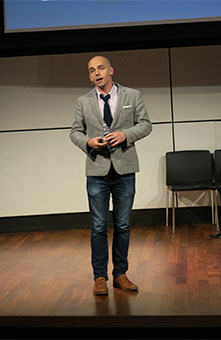
Can Mobile Technology Transform the Classroom?
How can educators create an active learning environment that leverages the talents of both students and professors? According to Kyle Jensen, associate dean and Shanna and Eric Bass ’05 Director of Entrepreneurship at Yale SOM, mobile technology can be a key tool.
In a talk titled “Hacking the Classroom with In-Class Mobile, Social Technology,” part of the 2015 Yale Technology Summit held at Yale SOM on October 30, Jensen discussed the mobile applications that he develops to promote active learning in the classroom. Mobile technology allows both him and his students to better learn from one another, he said.
“Mobile technology facilitates tight iterations, “ he said. “I am delivering content and feedback to my students, and they are delivering back to me questions and answers, and I am then dynamically changing the content, changing the assessments, changing my feedback in a way that produces an active classroom where the students are shaping what goes on in the time that we have together.”
Jensen’s mobile apps give him a real-time view of his students’ progress. “We don’t wait until the end of the semester to have one giant paper,” he said. “Instead, in my classes, class members have an assessment every time we meet. And so in that fashion, they know how they’re doing, and I am able to identify people who might be struggling or concepts that are not fully absorbed by the class.”
The apps also allow students to carry on an ongoing virtual discussion and help each other learn. “There’s only one of me,” Jensen said. “I can never be as effective as a body of class members that themselves care about the learning process and want to help each other.”
The day-long Technology Summit included workshops, panel discussions, and case studies of technology breakthroughs around the university. Brian Scasselatti, professor of computer science, cognitive science, and mechanical engineering, delivered a keynote address titled “Robots that Teach.”
